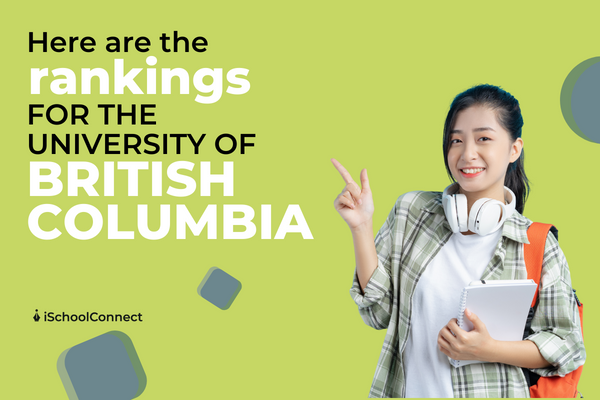Table of Contents
About the University of British Columbia,
The University of British Columbia (UBC) is a global center for teaching, learning, and research that is consistently ranked among the world’s top 20 public universities. UBC values innovation and turns ideas into action. It has been providing opportunities for people with the curiosity, drive, and vision to shape a better world since 1915. In this blog, we will discuss rankings for the University of British Columbia
University of British Columbia | A brief overview
UBC, a world-class center for teaching, learning, and research, transforms personal initiative into innovation and new ideas into impact. The University of British Columbia is a public research university in British Columbia, Canada.
Founded in 1908, the university first opened its doors to students in 1915. It is divided into two main campuses- the Vancouver campus and the Okanagan campus in Kelowna.
The Vancouver campus is larger than the others, housing more than 85 percent of UBC students. In a recent year, approximately 23% of students on the Vancouver campus and around 13% on the Okanagan campus were international. Tuition at UBC varies according to the degree program and is higher for international students. First-year UBC undergraduates get guaranteed university housing facilities. Newly admitted international students in their second year can choose a housing preference as well. Returning undergraduate and graduate students can also find housing.
Vancouver also has UBC Robson Square, the UBC Learning Exchange, and the UBC Centre for Digital Media. Faculty of Medicine students can acquire clinical education at more than 80 training sites throughout British Columbia. UBC’s two regional bases in Hong Kong and India foster local connections and strengthen collaborations for research, learning, and capacity development.
The Vancouver campus has over two dozen academic divisions, while the Okanagan campus has only eight. Both campuses’ academic calendars include two-term winter and summer sessions, though the summer session is optional. English is the primary language used for teaching at UBC. First-year international students at UBC’s Vantage College can enroll in the Vantage One program, which aims to help students improve their English by extending their first year of study from eight to eleven months.
Following graduation, students enter the second year of their UBC degree program.
TRIUMF, Canada’s national subatomic physics laboratory, the Centre for Sustainable Food Systems at UBC Farm, and the Institute for Healthy Living and Chronic Disease Prevention are all UBC research facilities.
Rankings

US News and World Report
University of British Columbia Rankings
- 35 in Best Global Universities
- 2 in Best Global Universities in Canada
University of British Columbia Subject Rankings
| 22 in Biotechnology and Applied Microbiology | 14 in Environment/Ecology |
| 34 in Clinical Medicine | 22 in Biotechnology and Applied Microbiology |
| 38 in Biology and Biochemistry (tie) | 34 in Clinical Medicine |
| 38 in Cardiac and Cardiovascular Systems (tie) | 38 in Biology and Biochemistry (tie) |
| 40 in Electrical and Electronic Engineering (tie) | 38 in Cardiac and Cardiovascular Systems (tie) |
| 46 in Education and Educational Research | 40 in Electrical and Electronic Engineering (tie) |
| 47 in Arts and Humanities | 46 in Education and Educational Research |
| 56 in Computer Science | 46 in Food Science and Technology (tie) |
| 57 in Agricultural Sciences | 47 in Arts and Humanities |
| 64 in Civil Engineering | 56 in Computer Science |
| 68 in Economics and Business | 57 in Agricultural Sciences |
| 93 in Endocrinology and Metabolism | 64 in Civil Engineering |
| 95 in Cell Biology | 68 in Economics and Business |
| 51 in Mathematics (tie) | 68 in Engineering (tie) |
| 63 in Infectious Diseases (tie) | 93 in Endocrinology and Metabolism |
| 66 in Geosciences (tie) | 95 in Cell Biology |
| 77 in Immunology (tie) | 147 in Condensed Matter Physics (tie) |
| 117 in Mechanical Engineering | 153 in Energy and Fuels |
| 151 in Materials Science | 162 in Chemistry |
| 182 in Chemical Engineering (tie) | 32 in Microbiology (tie) |
| 51 in Mathematics (tie) | 42 in Neuroscience and Behavior (tie) |
| 63 in Infectious Diseases (tie) | 62 in Molecular Biology and Genetics |
| 66 in Geosciences (tie) | 77 in Pharmacology and Toxicology (tie) |
| 77 in Immunology (tie) | 89 in Oncology |
| 117 in Mechanical Engineering | 175 in Optics |
| 151 in Materials Science | 189 in Nanoscience and Nanotechnology (tie) |
| 8 in Plant and Animal Science | 13 in Social Sciences and Public Health |
| 24 in Psychiatry/Psychology | 27 in Radiology, Nuclear Medicine and Medical Imaging |
| 24 in Public, Environmental and Occupational Health | 49 in Space Science (tie) |
| 27 in Radiology, Nuclear Medicine and Medical Imaging | 77 in Surgery |
| 77 in Physics (tie) | 85 in Water Resources (tie) |
| 329 in Physical Chemistry (tie) |
2022-2023 Indicator Rankings

- Global score- 77.5
- Global research reputation- 40
- Regional research reputation- 30
- Publications- 32
- Books- 55
- Conferences- 147
- Normalized citation impact- 226
- Total citations- 32
- Number of publications that are among the 10% most cited- 35
- Percentage of total publications that are among the 10% most cited- 211
- International collaboration – relative to country- 411
- International collaboration- 315
- Number of highly cited papers that are among the top 1% most cited- 33
- Percentage of highly cited papers that are among the top 1% most cited- 205
QS World rankings
- It ranked 1201-1400 in QS World University Rankings 2023.
Key takeaways
- The University of British Columbia is a global center for teaching, learning, and research. It consistently ranks among the world’s top 20 public universities. UBC values innovation and turns ideas into action.
- Founded in 1908, the university first opened its doors to students in 1915. It has two main campuses, namely the Vancouver campus and the Okanagan campus in Kelowna.
- UBC ranks #35 in the Best Global Universities US News and World Report ranking. It also ranks high in various rankings and rating systems such as subject, graduate school, and QS rankings.
Did you find this blog informative? If so, please share your thoughts in the comments section below. Click here to contact us for more information on the University of British Columbia rankings. We would be happy to assist you with your queries.
Liked this blog? Read next: Pacific University | Rankings, programs, fees, and more
FAQs
Q1. How is UBC Vancouver different from UBC Okanagan?
Ans- The main distinction between the two is the size of the campuses. While UBC Vancouver has over 60,000 students, UBC Okanagan has approximately 12,000 students. All other differences in program availability, faculty, and research projects are primarily due to the campus size.
Q2. How much does it cost to study in British Columbia for international students?
Ans- UBC’s tuition fee for international students is CAD 39,575 or more, or approximately 24.48 lakhs for an Indian student. Students should also be prepared to spend 15,000 USD or 9.28 lakhs on rent, utilities, meals, health insurance, personal care, and other expenses.
Q3. Does UBC offer a work-while-studying program to international students?
Ans- Yes, all UBC students have the option of working while studying. International students, on the other hand, are required by immigration regulations to work in a limited capacity.







